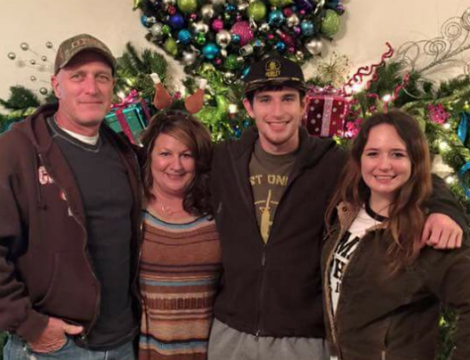Mesothelioma Survivor Believes Trial Drug Saved His Life
Stories from SurvivorsWritten by Tim Povtak | Edited By Walter Pacheco

Mesothelioma survivor David Broyles once worried about living long enough to see the birth of his daughter.
Now, almost 22 years later, he will see her graduate from college.
He has beaten the odds.
“Miracles happen,” Broyles told Asbestos.com. “They happen every day in this world, small miracles and large miracles. I’m evidence. I can’t change the facts.”
Six Months to Live
Broyles, 55, was devastated by his diagnosis of peritoneal mesothelioma more than two decades ago. He was young, strong and invincible — or so he thought.
He was a top-ranked mountain bike racer who owned his own construction company in Austin, Texas. Broyles thought his surgery for a hernia would be little more than a minor distraction back in 1996.
It became a blessing — and a curse.
He couldn’t believe what the surgeon told him afterward, when more tests were ordered and the rare diagnosis was eventually delivered.
“The surgeon didn’t have the best bedside manner, but he told me ‘you got six months to live. Get your stuff in order,’” Broyles recalled. “My wife and I went to the library and did our homework to learn more about the cancer, and it was horrible. I was devastated. I almost passed out. We were crying for days at home.”
Pregnancy a Welcomed Distraction
A few weeks later — shortly after starting his chemotherapy — his wife told him she was pregnant again.
Broyles’ son, Tyler, was four.
Although treatment for peritoneal mesothelioma has advanced considerably, there was very little hope offered for a patient 20 years ago.
“The pregnancy was a good distraction for us. It made me want to fight this battle even harder than I would have,” Broyles said. “I had this will to live, and just said, ‘I’m not going to accept this diagnosis. I want to see my children grow up. I want to see them graduate. I want to live to be 55.’”
Broyles underwent major cytoreductive surgery, considered risky and far from perfected back in the 1990s. The tedious, seven-hour surgery cleaned out tumors throughout his abdominal cavity.
Whatever It Takes
Broyles jumped directly into a clinical trial involving a combination of chemotherapy and the experimental drug ranpirnase (Onconase), which is created from an enzyme found in the Northern Leopard frog.
The drug supposedly worked by speeding up the body’s ability to destroy or stop cancer cells from dividing.

Try our new clinical trials search tool to find active trials near you. Get help enrolling today.
Find a Clinical TrialAfter each chemotherapy session, Broyles would train on his mountain bike, regardless of how bad he felt or what his oncologist suggested. He pushed himself to the limit, even winning races in the midst of a chemotherapy cycle.
“I just felt the best way to deal with cancer was to punish it. I wanted to make it as uncomfortable as possible for the cancer, because it sure made me uncomfortable,” he said. “It helped me to hurt. I was just obsessed with riding after chemo.”
Broyles responded so well to the clinical trial that the company making the drug started sponsoring his competitive mountain biking, promoting him as a spokesperson.
“They called me the wonder child. They had never had a patient so young and otherwise so healthy,” he said. “My situation was unheard of back then. It defied all logic. I guess you could say I was an anomaly.”
Although the trial was later discontinued for lack of overall efficacy, Broyles believes firmly the drug saved his life. He’s thankful to be one of the lucky ones who responded so well to it.
He also feasted on alternative medicines and supplements, including shark cartilage, various minerals and high doses of vitamins — often 30 pills each day.
“My oncologist, he was out there, very unconventional,” Broyles said. “He was all for that stuff.”
Second Major Surgery Followed
For two years, regular CT scans showed no cancer recurrence, although it returned on a smaller scale in 1998, prompting a second cytoreduction.
“I told them they should have put a zipper on my belly, like one of those zip lock baggies. It would have made it easier the second time,” he said. “But I went through it again, and they got it all out that time.”
Broyles has experienced no recurrence since. His scans are done only every five years now.
“My brother told me, ‘you got the best, worst luck I’ve ever seen,’” he said. “My mother said the hernia was God’s way of getting an early detection.”
‘Lucky in a Lot of Ways’
Without the hernia surgery, Broyles is unlikely to have discovered the cancer until it had spread more extensively, making it more difficult to control.
Less than a third of mesothelioma patients even qualify for surgery because it typically is detected so late.
“I was lucky in a lot of ways. At times I feel guilty because I understand so many others die from this. It’s weird, I want to live but sometimes feel guilty about still being alive,” he said. “My surgeon has retired, and so has my oncologist. I’ve outlived some of the medical people who treated me.”
Broyles still runs his construction company in Austin. Away from work, he hunts, fishes and enjoys the great outdoors every chance he gets.
And even at 55, he still rides the local bike trails.
“I don’t think once you’ve had cancer, it ever really leaves you mentally, even after all these years,” Broyles said. “I know it has given me a sense of awareness that I never had before. I can appreciate things a lot more. And hopefully, I can help others along the way.”




